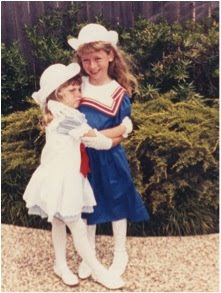Well, hello there. My name is Melissa. I used to be around here some. Forgive me for the awkward intrusion. This is less of an essay or a blog post and more like sharing some disjointed sentence-fragments I scribbled down this morning. I hope you don’t mind. Sometimes when I have the most in my heart, I am least able to write. But I guess I just wanted to write something, you know? You see, like the colors of spring, the beauty of Jesus is taking me again by surprise this Holy Week. Each Holy Week I wonder if the climactic narratives about Jesus will finally this time, this year, hit me flat. But they don’t. They seize me again.
Jesus seizes me.
I grew up in a Baptist church. My most vivid memories of the Easter season are from Palm Sunday, the big green palms and the choir decked in long white robes. And the hymns. But then I don’t remember much of anything between Palm Sunday and Resurrection Sunday. Now, that could say more about me than it does my church tradition. Memory is a funny thing, isn’t it? (Also, I wasn’t paying that much attention.)
Several years ago now I got the opportunity to spend some time studying with teachers and students from other Christian denominations. I think often about words I first read those years ago from Walter Brueggemann. He said that the final three days of Passion (Friday, Saturday, and Sunday) “must not be homogenized but must be kept discreet and distinctive, each for its own weightiness” (Brueggemann reviewing Alan E. Lewis’ Between Cross and Resurrection). For the first time, I learned to slow down and carefully take my time walking through Holy Week. My friends taught me to contemplate what the cross of Christ meant on its own terms, to confront the violence in my own heart on Good Friday. To feel the utter despair of dashed hopes and dreams on Holy Saturday. They introduced me to thinkers such as Paul W. Meyer who said things like: “We need sometimes to think about the crucifixion of Jesus as if there had been no resurrection just so that we might understand what the resurrection itself meant for those early Christians” (“The This-Worldliness of the New Testament” by Paul W. Meyer). Thinkers like Meyer forced me to tarry in front of Christ’s cross before rushing to that refrain so familiar to me, “Sunday’s coming!”
I’m currently finishing a wonderful book called A Glorious Dark by A.J. Swoboda (Grand Rapids: Baker Books, 2014). Swoboda argues that Christian faith must enter all three days of the long weekend: “we must embrace the pain of Friday’s sunset, the awkwardness of Saturday’s silence, and the hopeful sunrise of Sunday morning.” Swoboda suggests that most of us, rather than entering the whole weekend, are selective about the one day we want to experience. Swoboda says that this picking and choosing creates three incomplete “knock-off” versions of Christianity:
“Friday Christianity is the religion of those who’ve chosen to find their identity in a spirituality of defeat, death, and loss. Their spiritual depth abides solely in the torment of the suffering on the cross . . . Sunday Christianity is equally problematic. These chipper, slick, ever-too-happy Christians see God in, and only in, victory, prosperity, and blessing . . . Sunday Christianity dismisses the realities of death and loss . . . Saturday Christianity is for those of us who’ve come to consider doubt and ambiguity as final destinations rather than conduits through which we actually enter into resurrection. When we celebrate only Holy Saturday, we believe, in our doubt and questioning, that we have permission to be cynics and deconstructionists—and that everyone should sit in our graves with us.”
I think Swoboda is right about this tendency. I can certainly see it in myself and I think I can see it in others around me too. Even if I have learned to journey a little slower through Holy Week, to take each day on its own, at heart I have mostly just been a Holy Saturday Christian, I think. Swoboda helped me see that about myself and made me long for more.
Few Christian thinkers conceive of how the death of Jesus and the resurrected life of Jesus co-exist in the Christian as creatively as the apostle Paul. Paul writes to the Corinthians:
For we do not want you to be unaware, brothers, of the affliction we experienced in Asia. For we were so utterly burdened beyond our strength that we despaired of life itself. Indeed, we felt that we had received the sentence of death. But that was to make us rely not on ourselves but on God who raises the dead. He delivered us from such a deadly peril, and he will deliver us. On him we have set our hope that he will deliver us again. (2 Cor. 1.8-10 ESV)
And Paul continues a few chapters later:
We are afflicted in every way, but not crushed; perplexed, but not driven to despair; persecuted, but not forsaken; struck down, but not destroyed; always carrying in the body the death of Jesus, so that the life of Jesus may also be manifested in our bodies. For we who live are always being given over to death for Jesus’ sake, so that the life of Jesus also may be manifested in our mortal flesh. So death is at work in us, but life in you. (2 Cor. 4.8-12 ESV)
Paul not only speaks of sharing in Jesus’ sufferings, he also speaks of sharing in his comfort (2 Cor. 1.3-6). Most stunning is how Paul articulates his apostolic ministry. He describes it as an experience akin to death for him but he says that it renders life in the ones whom he serves. So death is at work in us, but life in you. This absolutely takes my breath away.
Bringing someone else life can feel a lot like dying.
We love to be with people who are “life-giving,” right? We use this phrase often. But we grow weary of being the life-giving ones, because, frankly, it requires a whole lot of dying that we don’t want to do. Because it hurts a lot. Because it goes against everything in the depths of us most of the time. We quickly tire of being the ones who are pouring ourselves out. We want people to get their crap together, to stop being so draining. But if we carry Jesus’ death in our own bodies, if we pour out all we have, if we die to our own selfishness, our own agendas, we will gain everything. The life of Jesus of Nazareth will be made manifest in our mortal flesh, Paul says.
A few days ago I read a sermon by Rowan Williams called “Into Daylight” from Easter Morning, 2004 (see Choose Life; London: Bloomsbury Publishing, 2013). I thought it was incredibly beautiful and worth sharing an excerpt here with you. Williams says:
“If you believe that Jesus rose from the dead, you are not just believing an odd fact from two thousand years ago; you are trusting that there is a kind of life, a kind of love and trust and joy that is the very essence of Jesus’ identity which is now coming to life in you. As it comes to life, you begin to know that no amount of pressure and stress and suffering in your life has power in itself to break the bond that has been created between you and Jesus’ life and activity. You are alive with a fuller and deeper life than just your own. Your resources are more than you could ever have imagined. Jesus rises from the dead so as to find not only his home in heaven but his home in us. He rises so that we may rise out of the prisons of guilt, anxiety, self-obsession or apathy that so constantly close around us. But for this to happen, says St Paul, we have to go on, day after day, getting used to parts of us dying, just as Jesus died: we have to get used to the beloved habits of self-serving and self-protecting being brought into the light that shines from Jesus’ face and withering away in that brightness. That’s why Paul says that Christians go around with both death and life at work in their lives—always trying to let the light of Jesus kill off these sick and deadly habits, always letting the new life that is ours but so much more than ours shine through” (Rowan Williams, Choose Life).
Friends, I wish you and all the ones you love a most meaningful and sacred weekend reflecting on the life, death, and resurrection of Jesus our Lord. From him and through him and to him are all things. “For the love of Christ urges us on, because we are convinced that one has died for all; therefore all have died. And he died for all, so that those who live might live no longer for themselves, but for him who died and was raised for them” (2 Cor. 5.14-15 NRSV).

















